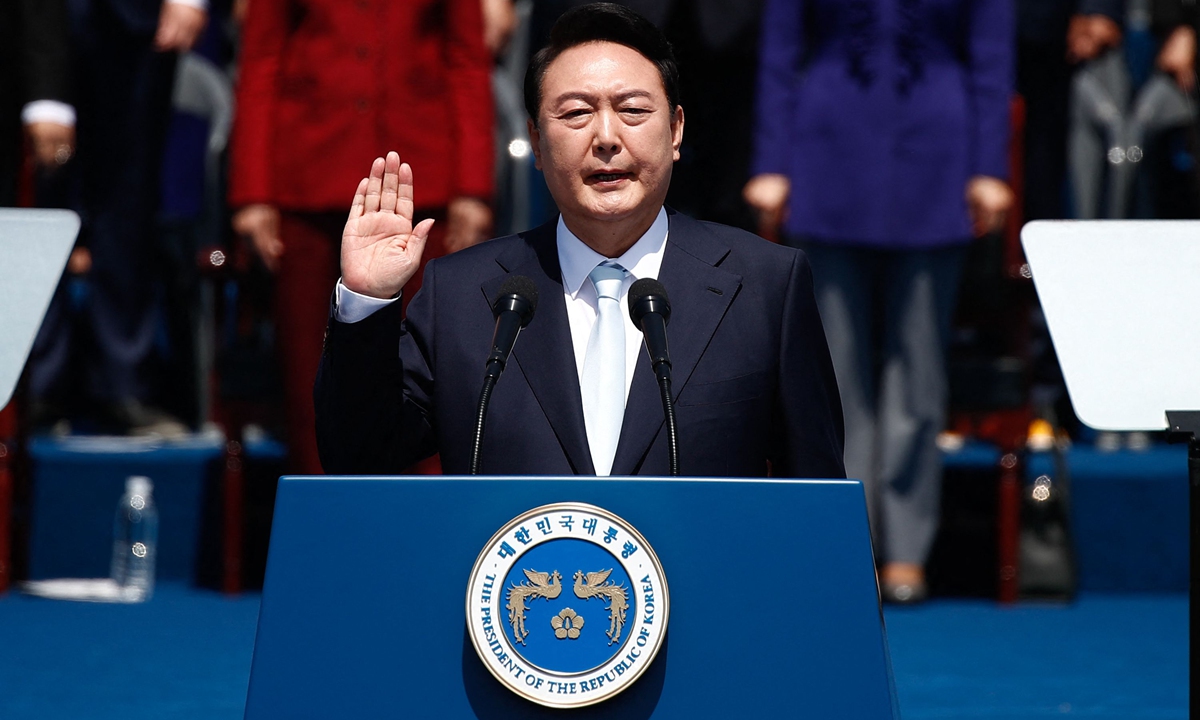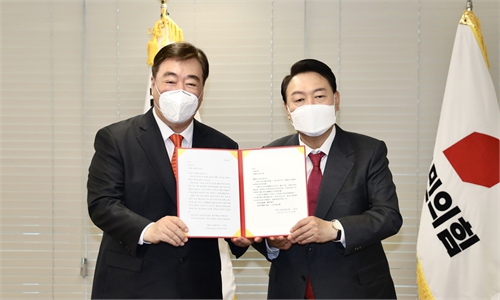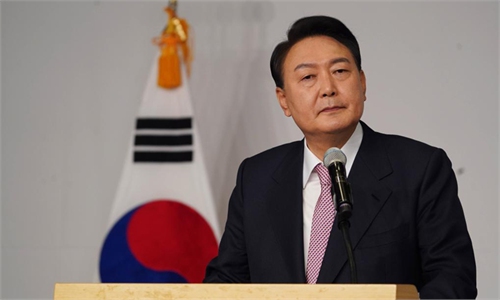Chinese VP attends SK president inauguration, showing sincerity in furthering ties amid US Indo-Pacific strategy push

South Korea's new President Yoon Suk-yeol takes an oath during his inauguration in front at the National Assembly in Seoul on May 10, 2022. Photo: VCG
Chinese Vice President Wang Qishan on Tuesday attended the inauguration of South Korean President Yoon Suk-yeol, reflecting China's wish to further relations and cooperate with South Korea to cope with challenges to regional stability and prosperity despite the US' continuous efforts to draw South Korea closer to its geopolitical camp and Indo-Pacific Strategy.Observers have predicted some adjustment and challenges in China-South Korea relations after the power transition in Seoul, considering the US' activities to sow discord and Yoon's remarks of enhancing South Korea's alliance with the US during the election campaign.
US President Joe Biden will stop first in South Korea on May 20 during his first Asian trip since taking office to "highlight the US focus on Indo-Pacific," said White House official Kurt Campbell on Monday. Biden will then visit Tokyo and attend a QUAD summit there.
The US has been putting much effort on winning over South Korea and engaging Seoul into its geopolitical camp, said Da Zhigang, director of the Institute of Northeast Asian Studies at Heilongjiang Provincial Academy of Social Sciences.
Knowing South Korea won't easily join the security pact of QUAD and serve US interests at the expense of its ties with China, the US offered the Indo-Pacific Economic Framework (IPEF) to attract South Korea, while South Korea is interested in more platforms to communicate with Southeast Asia in regard to trade and supply chains, Da told the Global Times on Tuesday.
The IPEF was proposed by the US in October 2021 and is expected to formally launch later this month. The South Korean government has decided to join the IPEF, a decision reflecting its intention to take a leading role in regional trade as an initial member of the framework, Business Korea reported Tuesday.
The US' blueprint in the Asia-Pacific is to contain China's development by involving as many regional countries as possible to marginalize China in politics, economy and security. Yet other countries will prioritize their national interests rather than solely serve the US' needs, said Li Haidong, a professor from the Institute of International Relations at the China Foreign Affairs University in Beijing.
China welcomes all its neighbors to develop balanced relations with other countries on an equal basis, as long as such relations do not harm China's interests, experts said.
Yang Xiyu, a senior research fellow at the China Institute of International Studies, told the Global Times that China doesn't need to form its own camp to counter US' small cliques, but should maintain strategic confidence. "China is committed to building a better model -- a global system featuring equality, openness and win-win cooperation."
China and South Korea are facing challenges and opportunities internally and externally, and should forge closer ties to jointly cope with those challenges, contributing Asian wisdom to global governance, experts said.
For the new government, the major test is how to make best use of the diplomatic legacy of the Moon Jae-in administration, managing South Korea's foreign relations amid the US-China rivalry, properly handling the increasingly complicated geopolitical realities to maximize South Korea's interests, observers said.
Vice President Wang met with Yoon after attending the latter's inauguration. Wang delivered President Xi Jinping's greetings to Yoon and raised suggestions on bilateral relations in the next phase.
The two sides should enhance strategic communication and high-level exchanges, deepen practical cooperation in key fields and with third party market, hold more activities to enhance people-to-people friendliness, strengthen communication and coordination on regional and international affairs to safeguard multilateralism and free trade, and cooperate on the Korean Peninsula issue and properly handle sensitive topics, Wang said.
Yoon asked Wang to deliver his greetings to Xi. Yoon said South Korea is willing to increase high-level exchanges, enhance cooperation of different areas, and push bilateral relations into a new chapter.
Da noted the attendance of such a high-level Chinese official to the inauguration is unprecedented in China-South Korea relations, and fully demonstrates China's sincerity in further developing ties.
Yoon's tone on many topics in his inauguration speech was softer than in his election campaign. It may take one to two months to observe Yoon's policy based on not only his remarks but also the new government's deeds, Da said.
But as long as the two countries uphold the principle of mutual respect, wisely handle sensitive topics and push forward cultural exchanges to enhance mutual understanding, relations will remain stable, the expert said.


